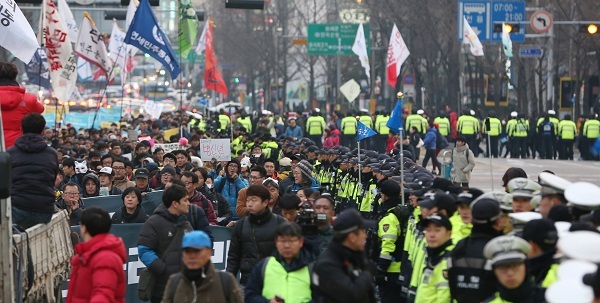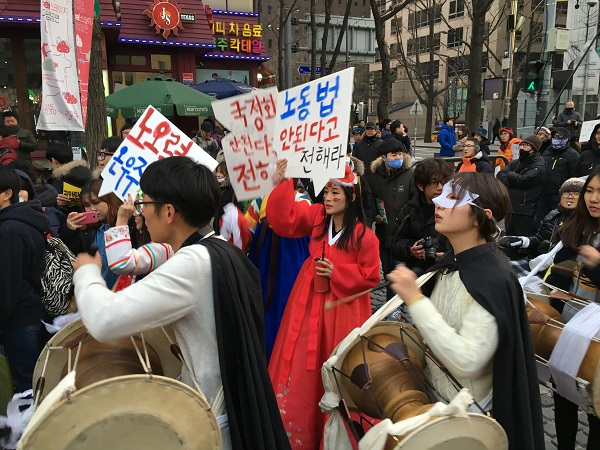On Saturday afternoon, Gwanghwamun Square, which was shut down by police bus barricades to stop protesters a month ago, turned into a playground for antigovernment demonstrators blowing horns and shaking tambourines.
Under a “noisy” and “uproarious” theme, an estimated crowd of 2,500 gathered in the square in central Seoul to signify their opposition to the sedition charge leveled against an umbrella union leader and the government’s push for controversial labor, trade and education polices.
The demonstration was a follow-up to a series of mass rallies in recent months against conservative President Park Geun-hye, who has pressed ahead with labor market reforms, opening of agricultural market and reintroduction of state-authored history textbooks.
It was much smaller than the other two rallies that drew as many as 70,000 people to central Seoul.
Many of the participants turned up with tambourines, vuvuzelas, drums and whistles to make noise and create a ruckus, with some wearing playful and glowing masks of Guy Fawkes, monkeys cats and other characters.
 |
| Yonhap |
“I came here today as this country is really backtracking. I cannot stand the government trying to adopt state-issued history books as a mother,” said Kim Hye-ryeon, 39, who took two children aged 3 and 5 to the rally scene despite the biting cold.
“There are many parents like me who want to come but fear violence during protests. It would be okay to bring kids to this kind of event which is like a festival,” Kim said. “I doubt my action can lead to any change. But until I see a progress, I will continue to come to rallies.”
The event was held in a peaceful manner without major clashes between police and protestors, with no reports of injuries or police arrests. Nearly 6,000 police officers were dispatched in central Seoul, with 240 of them controlling the traffic.
Police earlier banned the rally organizers ― the Korean Confederation of Trade Unions and Korean Peasants League ― from staging a protest in Seoul Plaza in front of City Hall, citing a conservative group that booked the venue earlier. Instead, the rally organizers asked the Seoul Metropolitan Government for a permit to hold a cultural event, not a rally, in Gwanghwamun Square.
As the event was permitted on the condition that it would be a cultural event, not a demonstration, police warned the rally organizers not to raise political issues during the event.
Controversy also swirled as the right-wing organization did not stage its rally in Seoul Plaza on Saturday afternoon, with critics accusing the group of intentionally disrupting the antigovernment protesters’ efforts to hold a demonstration in the location.
In South Korea, all assemblies are allowed upon declaration though police can issue a ban when there are multiple applications for the same venue.
As the rally kicked off at 3 p.m., some 100 civic groups and labor unions under the KCTU greeted a slew of speakers, singers, dancers and artists onstage, with many of them holding up placards reading “Step down, Park Geun-hye,” “Stop crackdown on protests” and “Stop labor market reform.”
“It is really entertaining,” said Ahn Tae-eon, 21, watching the performance and blowing vuvuzela to show his support for speakers onstage.
Park Suk-wook, one of the main rally organizers, came up on stage to lament the prosecutors seeking to file sedition charges against the KCTU leader Han Sang-kyun.
“The sedition charge was applied under the Japanese colonial rule and authoritarian regimes. We will fight against destruction of democracy and march loudly,” he said in an opening speech.
Prosecutors are considering charging Han with allegedly inciting violence during the Nov. 14 rally and plotting to pose a threat to public security, which carries a sentence of up to 10 years in prison and a financial penalty of up to 15 million won ($12,700).
It has been rare for prosecutors to level sedition charges against protestors. The last time prosecutors applied the charge was in 1986 during the authoritarian Chun Doo-hwan administration when pro-democracy activists threw rocks and firebombs at riot police.
At around 4:30 p.m., the protesters began to march about 3.5 kilometers from Gwanghwamun Square through Jongno 3-ga toward Seoul National University Hospital, where a 69-year-old farmer lay in a coma. Baek Nam-ki remained unconscious Sunday after being hit by a police water cannon when the first rally turned violent.
Dancing to K-pop and carol songs, a group of women in Korean traditional shaman costume jumped up and down through the march to arouse excitement among the crowd.
 |
| Ock Hyun-ju/The Korea Herald |
“To correspond to the theme of noisy and uproarious, we disguised ourselves as shamans,” said artist Eo Hyo-eun, 25, holding a placard reading “the spirit of dictatorship is coming back.”
The placard was aimed at satirizing Park’s previous remarks concerning history textbooks. She earlier mentioned “spirit” in the context that those not taught by
correct history would have a distorted spirit.
“We meant to make fun of President Park and raise awareness of controversial issues. … I think we have been well received as citizens cheered for us,” Eo said amid cheers from citizens watching the parade from the pavement.
The demonstration ended at around 6:30 p.m. in front of Seoul University Hospital, with the farmer Baek’s daughters making tearful speeches.
“It has been 36 days since my father collapsed. I wished I could convey good news today, but he is still asleep. I will pass your wishes to my father tonight,” said Baek’s daughter Min-joo-hwa. “Stay with us until my father as well as this country’s democracy restores.”
Despite the peaceful ending of the Saturday’s rally, police vowed legal action against the rally organizers, saying the cultural event was not pure in its intent and turned into an illegal demonstration.
“The organizers used placards carrying political meanings. Speakers onstage made political speeches. On the sidelines of the event venue, they also gave out leaflets calling on police to free Han Sang-kyun, chanting political slogans,” the police said in a statement.
Antigovernment rallies were held in 13 cities that day across the nation, drawing about 20,000 participants in total.
By Ock Hyun-ju (laeticia.ock@heraldcorp.com)

